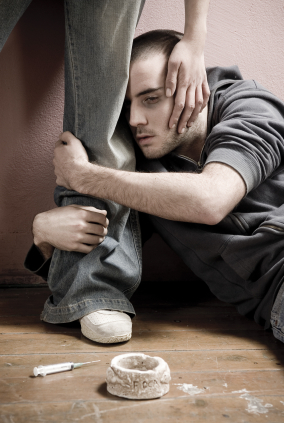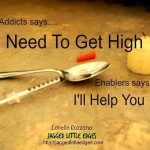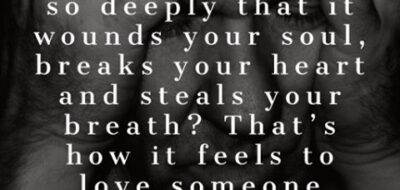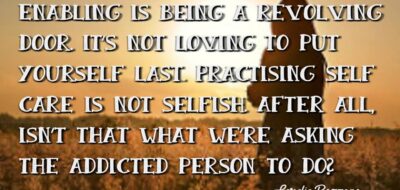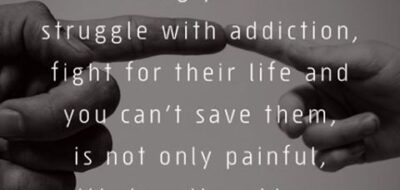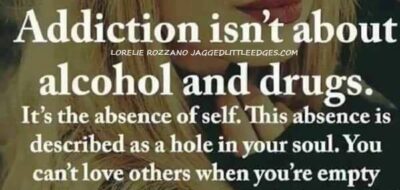Whether it’s your child, spouse, parent, sibling, or friend, one thing’s certain. If your loved one struggles with addiction, you’ll take it on. As a recovering addict who works with the addicted person’s family, I see it all the time.
If only I’d… Why didn’t you… What did I do wrong?
Families blame themselves, and each other, for the addicts choices and behaviour.
It’s this type of reaction, that enables addiction.
If something is my fault. I need to fix it.
Why?
So I can feel better.
The addicted person uses substance to feel better, while the family gets temporary relief, from enabling.
Enabling is the key aspect of addiction and substance abuse. The co-addict or primary enabler (the person who helps remove the natural consequences of the addicted person’s actions) feels they have an exclusive relationship with the addict. Of course they don’t. The addict’s exclusive relationship, is with their drug of choice.
The person who enables is unaware of their behaviours, as they’re ‘other’ focused. Just as the addicted person is ‘self’ focused. Both will need to detox. The addict from their DOC, (drug of choice) the enabler from their DOC – THE ADDICT.
If you don’t believe enabling is mood-altering, just try to stop it.
You’ll be uncomfortable. You’ll experience anxiety, stress, guilt, mood swings, sleeplessness, and mental obsession (thinking about the addicted person 24/7)
Just like a heroin user, the pain of detox will drive you back to the substance, or enabling behaviours, every time.
So what can you do?
First and foremost, educate yourself. Learn what role you play. Attend a family program at a rehab facility. Learn all you can about the disease of addiction. If you don’t believe addiction is a disease, you will lapse back into trying to ‘fix’ it. Addiction is the same as cancer. Both can be terminal, if left untreated. Families shouldn’t play doctor, with their addicted loved ones. Let the professionals do that.
Everything you require the addicted person to do, you need to do, also. You’re just as sick, as your addicted loved one. Some say, sicker. The addict’s choices result from a chemically influenced brain. You made yours choices, sober.
Families need a support group. It will be extremely difficult for you to say no. The challenge in early recovery for the addicted person, is learning how to stay abstinent and be honest. The challenge for the enabler is learning how to say no, and cope with the guilt. When you start setting boundaries and saying no, it’s going to get rocky, especially if the addicted person is still actively using.
Substance abusers use intimidating and aggressive behaviour, to get their way. They don’t believe you, when you say no. Based on their past experience with you, no, just means they get louder, then you will say yes.
Truthfully, there is no, NO, in an addict’s life. When I went to rehab I experienced no for the first time, ever. When you can’t manipulate your surroundings, you learn the meaning of no.
No, is crucial, when recovering from addiction and codependency.
Addiction is about what I want. Recovery is about what I need. Both families and the addicted person will find themselves thinking, I don’t want to go to rehab. I don’t want to go to meeting. I don’t want to open up. I don’t want to reach out, or ask for help.
It’s impossible to recover from this illness; if you’re not prepared to do the work. It’s not about what you want to do. It’s about what you need to do. The relief you get from doing the work, will keep you coming back.
There will be set backs along the way. Be patient. Just as the addicted person and their family member didn’t get sick overnight, nor do they get better overnight. Recovery is a process. It’s entirely based on the work you’re willing to put into it.
Each party will need to recover separately, from the other. I can’t use the recovering, addicted person, as my support. It would be like the blind, leading the blind.
Stay open, honest and willing. Recovery lives in transparency.
Addiction is a genetic and environmental illness. Look at your relationship with mood-altering substances. Do you drink too much? Are you a workaholic? Is there something you’ve done, that you feel guilty about? When there’s addiction in the family, we all have to ask ourselves some difficult questions. If you’re not prepared to do the work, don’t ask the addicted person to do it.
You’re either part of the problem, or part of the solution.
There’s no middle ground.
Addiction tears families apart.
But there is hope.
Although you can’t make the addicted person well, you can greatly Influence the outcome. Set boundaries, look after yourself and be a healthy role model.
The only thing worse than one person struggling with addiction, is two.
Lorelie Rozzano
www.jaggedlittleedges.com
For more information please call this confidential support line for assistance. 1 888 614-2379.
